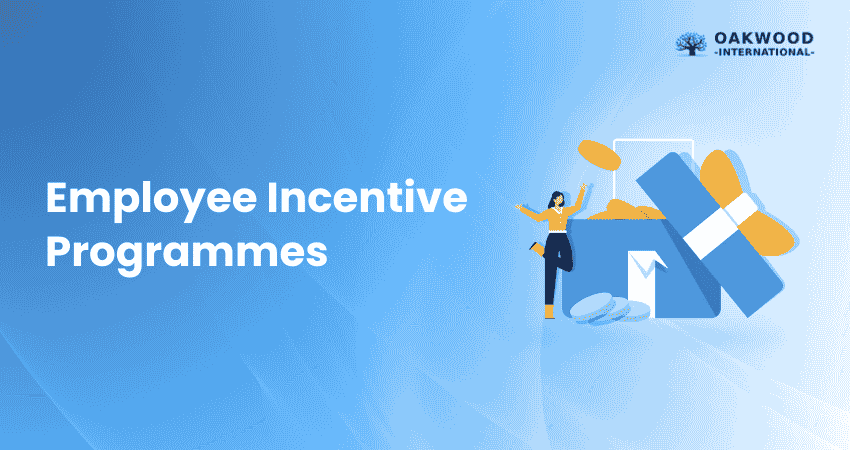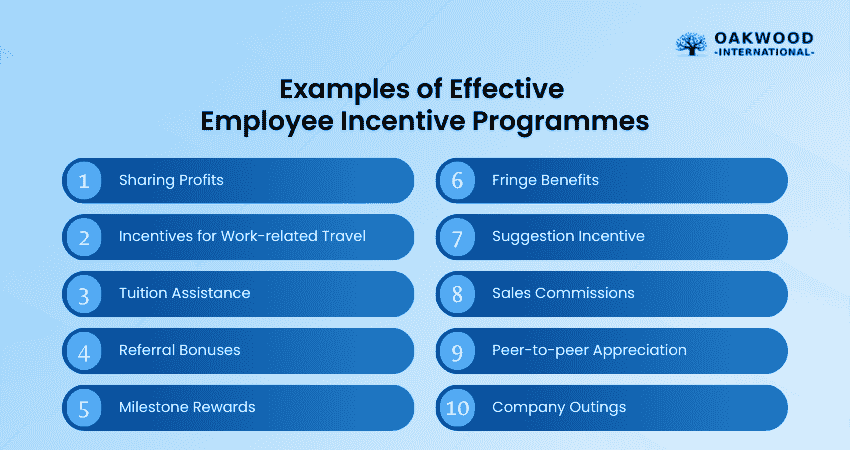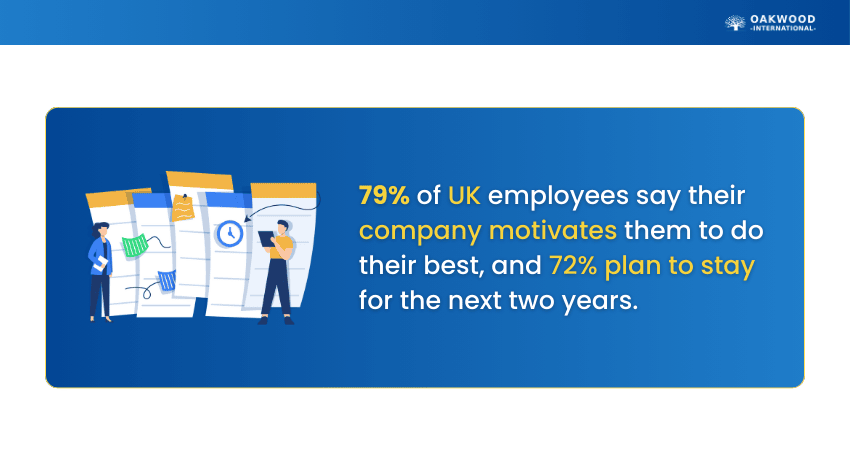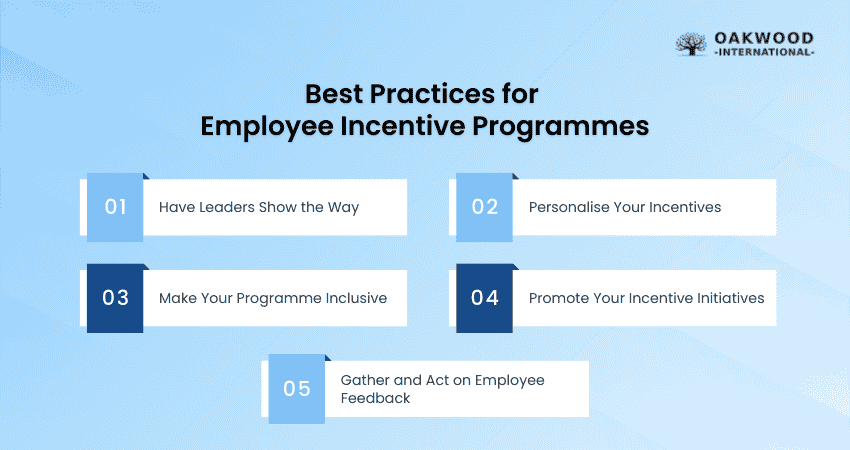Table of Contents


Ever stayed late to finish a task, solved a tricky problem, or helped a teammate shine, and wished someone would notice? Now imagine your effort earning a thank-you gift, a surprise day off, or even a weekend getaway. That’s the value of Employee Incentive Programmes. They turn “just another day at work” into something meaningful, fun, and rewarding.
In this blog, you’ll learn what Employee Incentive Programmes are, why they matter, and see 20 real examples. We’ll also explore the key benefits of Incentive Programmes and share simple tips to boost morale, teamwork, and engagement.
Table of Contents
1) What is Employee Incentive Programme?
2) 20 Examples of Effective Employee Incentive Programmes
3) What are the Benefits of Employee Incentive Programmes?
4) Best Practices for Employee Incentive Programmes
5) Conclusion
What is Employee Incentive Programme?
Employee Incentive Programmes are a great way to recognise and reward employees who go above and beyond. This could include someone who exceeds sales targets, delivers outstanding customer service, solves major issues, or supports their teammates exceptionally well. These top performers can receive rewards such as cash bonuses, gift cards, extra holidays, or opportunities for training and development.
HR teams can run these incentive programmes monthly, quarterly, or on special occasions. Rewards can be given to individuals, teams, or entire departments. Team-based rewards encourage collaboration, while department-wide recognition boosts a sense of pride and collective responsibility.
20 Examples of Effective Employee Incentive Programmes
There are many different types of Employee Incentive Programmes. Some give money as a reward, while others give things that are not money. These incentives for employees play a big role in keeping them happy, engaged, and excited to do their best. In this part, we will look at different rewards and how they help employees feel good and work better.

1) Sharing Profits
When a company makes a profit, it may choose to share part of it with its employees. This is known as profit sharing. It can boost morale and motivation, as employees know that when the company performs well, they benefit too.
Example: A company gives workers 5% of its profits at the end of the year as a bonus. Everyone who worked that year gets a part of the profit.
2) Incentives for Work-related Travel
Some companies reward employees with trips. These may be business-related, team-building retreats, or even leisure holidays. Employers might also offer perks such as hotel discounts, travel allowances, or free taxi rides. Such benefits can help employees feel valued, relaxed, and more engaged at work.
Example: The best-performing employees are given a free trip to another city for a fun weekend.
3) Tuition Assistance
The company gives money to workers who want to study or take a course. This is called tuition help. It helps the worker learn new things. It also helps the company because the worker becomes smarter and better at the job.
Example: A worker wants to take a course. The company pays part of the fees to help them learn.
4) Referral Bonuses
If a worker brings a friend to join the company and that friend gets the job, the worker gets extra money. This is called a referral bonus. It helps the company find good new people and makes the worker feel good.
Example: A worker brings a friend to join the company. After the friend gets the job, the worker gets £200.
5) Milestone Rewards
Workers get points for doing something big, like working for many years or doing a great job. They can use these points to get money, gift cards, or food and shopping vouchers. This makes them feel happy, and proud, and helps them keep working well. It shows the company cares.
Example: A worker who finishes 5 years at the company gets a £100 gift card and a thank-you note.
6) Fringe Benefits
Fringe benefits are extra things workers get besides their pay. These can be paid holidays, free health check-ups, help with child care, gym cards, or money for the future. These things make life better and show that the company cares about the workers.
Example: Workers get free gym cards, health checks, and extra days off apart from their salary.
7) Suggestion Incentive
Many companies reward employees who share valuable ideas. These ideas often help improve efficiency, reduce costs, or boost performance. Since employees understand their jobs well, their suggestions are often practical and effective. Offering rewards makes employees feel valued and motivated. It also encourages them to stay engaged and continue contributing.
Example: A worker shares an idea to save time. The company gives them a gift card as a reward.
8) Sales Commissions
Sales commissions are extra money given to workers who sell things. The more they sell, the more money they get. It is usually a small part of each sale. This is on top of their monthly pay. Some companies give bigger rewards if workers sell more or sell special items.
Example: A salesperson gets 10% of what they sell each month, on top of their regular pay.
9) Peer-to-peer Appreciation
Peer-to-peer appreciation allows employees to recognise each other by giving points for teamwork, support, or outstanding effort. These points can later be exchanged for gifts or rewards. This system promotes collaboration and provides regular recognition from colleagues, helping create a positive and inclusive workplace culture.
Example: One worker sends points to another worker to say thank you. The points are used for a gift.
10) Company Outings
Team outings are a fun way to bring workers together. It can be a picnic, a short trip, or going out after work. These outings help workers relax, talk, and become friends. This makes the team stronger, and the work feels nicer.
Example: The company takes all workers on a picnic day with food, games, and music.
Improve feedback skills and boost team growth. Join our Performance Appraisal Training today!
11) Employee Stock Ownership Plans
An employee stock ownership plan means workers get a small part of the company. They own shares in the business. This makes workers feel more loyal and care more about the company’s success. It also helps workers stay longer and not leave the job quickly.
Example: After 1 year at the company, a worker gets a small share of the business.
12) Flexible Working Options
A good reward is letting workers choose their work time. They can start or finish work at a time that suits them. They can also work from home on some days. This helps parents and people who care for others. It makes work and life easier for them.
Example: A parent chooses to work early in the day and finish early to pick up their child
13) Meeting Customer Satisfaction Goals
Workers who make customers happy get points. They can use the points for fun things like spa days, small trips, or big dinners. Some companies also give extra holidays or company gifts for these points.
Example: A support team with great reviews from customers gets a dinner voucher as a reward.
14) Opportunities for Career Growth
Many workers want to stay in a company that helps them grow. If the company gives them chances to learn new skills and move up, they feel happy and stay longer. Helping workers grow in their jobs is a great reward for them and good for the company.
Example: A worker who shows great skill is offered training and becomes a team leader.
15) Mental and Emotional Wellness
Companies can give support to help workers feel better. They can offer private talks with a counsellor to help with stress or problems. They can also give classes on how to stay calm and manage stress. Some companies give time for health or free apps for relaxing and meditation.

Example: The company gives free online counselling and lets workers take short wellness breaks.
16) Extra Vacation Days Incentive
Time off helps workers rest and feel less tired or stressed. It also makes them happier and more active at work. It is one of the best rewards to keep workers feeling good and working well. Even a short break can make a big difference.
Example: A worker who finishes their work early gets two extra days off as a reward.
17) Social and Community Wellness
Some companies give paid time off to workers so they can help in charity work they care about. This helps them feel good and connect with others. Some companies also plan charity events where all workers join. This brings people together and builds a strong team.
Example: Workers get one paid day off every year to do charity or help in their local area.
18) Employee Wellness Incentive Programmes
Employee wellness programmes help with body, mind, and feelings. These programmes may include health checks, fitness, and stress support. When workers feel good, they work better and stay happy at their job.
Example: Workers join a step-count challenge. Winners get prizes for staying active and healthy.
19) Programmes Supporting Remote and Hybrid Work
This incentive is designed for employees who work from home or split their time between home and the office. These workers can sometimes feel isolated, so companies offer rewards like bonuses, social events, thank-you messages, or wellness gifts to keep them engaged and connected.
Example: Remote employees receive a £100 bonus to help set up a comfortable and productive home workspace.
20) Incentives for Learning and Development
Many companies support employees learn new things. They give money for classes, training, or courses. They also give time to study or let workers join workshops. This helps workers do better at their jobs and grow in their careers. It also helps the company do better.
Example: A worker wants to learn new skills. The company pays for their weekend class and study time.
Improve your leadership style and team results. Join our Successful People Management and Team Leadership Course now!
What are the Benefits of Employee Incentive Programmes?
Employee Incentive Programmes give more than just happy and motivated workers. Here are some other big benefits:
1) More Work Done: When workers feel cared for, they try harder and do better work.
2) Saving Money: Even though rewards cost money, they help stop problems like people leaving jobs or missing work too much. This saves the company money in the long run.
3) Keeping Good Workers: When workers feel valued, they want to stay. This means the company doesn't need to spend money hiring new people often.
4) Finding New Workers: A good reward system shows new people that the company takes care of its team. This helps bring in new, smart workers.
5) Better Company Feeling: Incentives for employees help build a workplace where people feel they belong, take responsibility, and care about their work.
6) Reaching Goals: Rewards can help the company reach big plans faster by keeping everyone focused.
7) Better Teamwork: When rewards are given to teams or departments, people work together more and help each other more.
8) More Engagement at Work: When workers feel rewarded and respected, their engagement with work grows stronger every day.
9) Stronger Recognition Culture: Regular rewards and praise create a culture of recognition, where workers feel seen and appreciated for their efforts.
Best Practices for Employee Incentive Programmes
After you pick the best reward programmes for your workers, you need to use them well. Here are some best practices for Employee Incentive Programmes.

1) Have Leaders Show the Way
Leaders should be the first to join and support the reward programmes. When employees see their managers using and talking about rewards, they feel more excited to take part. Teach leaders how to talk about and use the programme so others will follow.
2) Personalise your Incentives
Not everyone likes the same reward. Some may like money, others may want time off or learning chances. Ask workers what they enjoy and give rewards that match their likes. This makes them feel special and seen.
3) Make your Programme Inclusive
Your rewards should be for everyone, not just a few people. Give different types of rewards so all teams and workers can enjoy them. Use an easy system that helps everyone take part, feel included, and get the recognition they deserve.
4) Promote Your Incentive Initiatives
Let your team know about the rewards. Uses fun posters, emails, or talks to spread the word. Make sure new workers learn about the rewards from the first day. This helps build engagement and keeps people excited to take part.
5) Gather and Act on Employee Feedback
Don’t guess what workers want, just ask them. Use short surveys or have simple chats to hear their thoughts. This shows you care and helps you make the rewards better and more useful for the team.
Conclusion
Employee Incentive Programmes are a powerful way to make workers feel happy, valued, and ready to do their best. Good programmes include simple rewards like time off, gift cards, or learning chances that build strong teams and help the company grow. When leaders support them and everyone takes part, the workplace improves. Keep them fair, fun, and easy, and your team will stay loyal and motivated.
Learn to manage people better with our certified People Management Courses - Join today!


 Back
Back



 Back to Catagories
Back to Catagories





 + 44 7452 122728
+ 44 7452 122728










